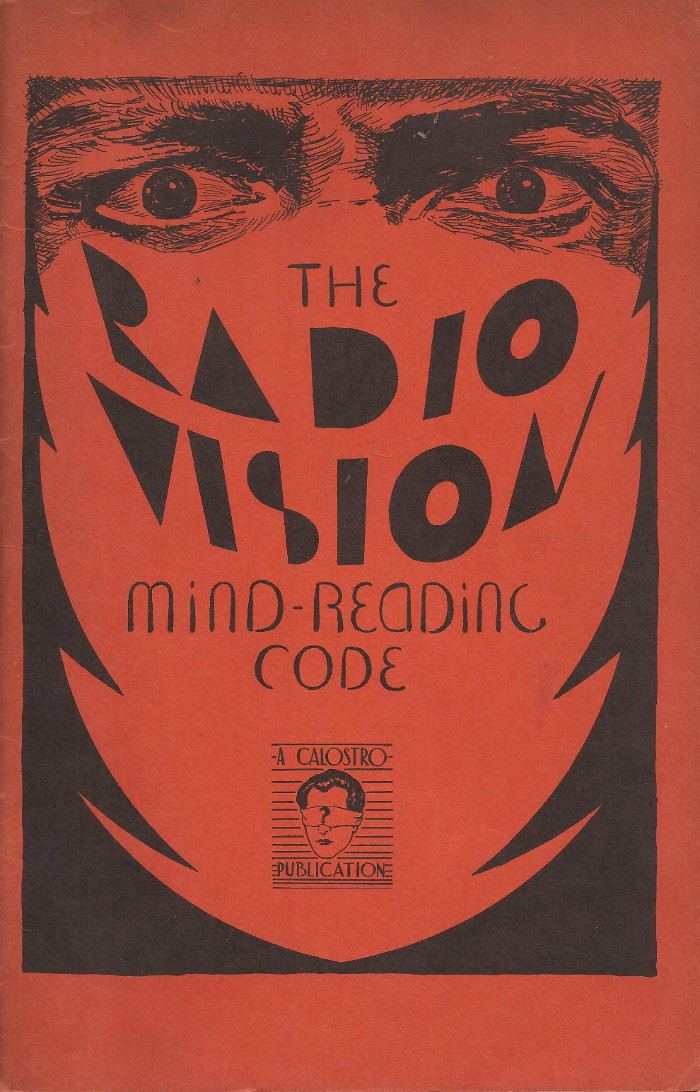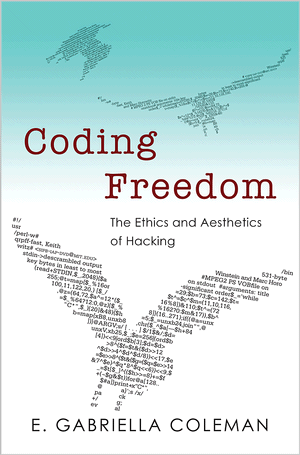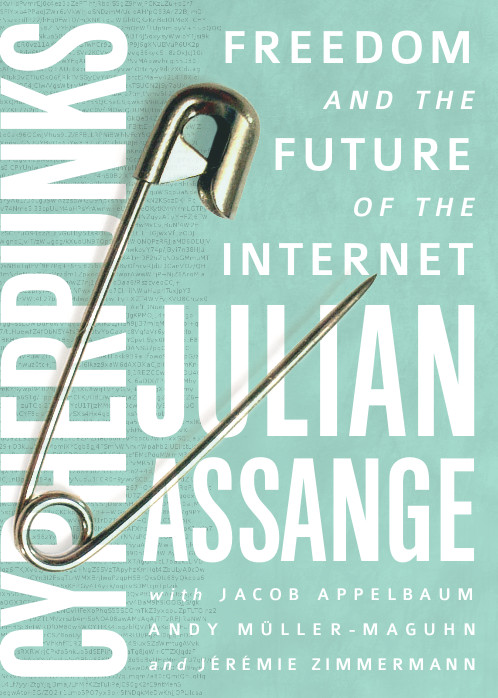Calostro: The New Radio-Vision Mind-Reading Code (1940)
Filed under book | Tags: · code, magic, telepathy

“This is the book by Calostro (Ralph W. Read, Ralph Wesley, 1882-1952) on the two person mind reading code. The verbal code act fully explained enabling you to transmit almost anything at all to your assistant. Numerals, letters, birthdates, Zodiac Signs, Lucky Numbers, Common Articles, First Names, Last Names, Coins and Paper Money, Special Tests for wathces, newspapers, books, and letters, Playing Cards, Titles and Professions, Animals and Birds, Sports, Countries and Nationalities, Organizations and Societies, Clubs, Emblems, Metals, and even Pictures and Drawings.” (source)
Publisher Calostro Publications, New Jersey, 1940
44 pages
commentary (Chris Woodyard)
author’s page at Magicpedia
E. Gabriella Coleman: Coding Freedom: The Ethics and Aesthetics of Hacking (2012–) [EN, SC]
Filed under book | Tags: · aesthetics, anonymous, anthropology, code, computing, ethics, floss, free software, hacker culture, hacking, intellectual property, internet, internet activism, software, web

“Who are computer hackers? What is free software? And what does the emergence of a community dedicated to the production of free and open source software–and to hacking as a technical, aesthetic, and moral project–reveal about the values of contemporary liberalism? Exploring the rise and political significance of the free and open source software (F/OSS) movement in the United States and Europe, Coding Freedom details the ethics behind hackers’ devotion to F/OSS, the social codes that guide its production, and the political struggles through which hackers question the scope and direction of copyright and patent law. In telling the story of the F/OSS movement, the book unfolds a broader narrative involving computing, the politics of access, and intellectual property.
E. Gabriella Coleman tracks the ways in which hackers collaborate and examines passionate manifestos, hacker humor, free software project governance, and festive hacker conferences. Looking at the ways that hackers sustain their productive freedom, Coleman shows that these activists, driven by a commitment to their work, reformulate key ideals including free speech, transparency, and meritocracy, and refuse restrictive intellectual protections. Coleman demonstrates how hacking, so often marginalized or misunderstood, sheds light on the continuing relevance of liberalism in online collaboration.”
Publisher Princeton University Press, 2012
Creative Commons Attribution-NonCommercial-NoDerivs 3.0 License
ISBN 1400845297, 9781400845293
264 pages
Responses: Jo Bates, Denisa Kera, Brett Lunceford, Jorge Luis Zapico, Alexander Halavais, Stéphane Leman-Langlois, Ethan Zuckerman
Reviews: James Grimmelmann (Jotwell: Cyberlaw, 2012), David Banks (Cyborgology, 2012), Eric Raymond (2013), Cade Metz (Wired, 2013), Mike Doherty (Hashbang, 2013), Bruce Byfield (Linux Mag blog, 2013), Bryan Behrenshausen (OpenSource.com, 2013), Roy S. Gutterman (Journalism & Mass Communication Q, 2014), Tim Jordan (American J Sociology, 2014), Emily T. A. Earl (Techno_ethno, 2014), Anne Elizabeth Yaniga (Techno_ethno, 2014), Sebastian Kubitschko (Culture Machine, 2014).
Coding Freedom (English, updated on 2013-1-18, PDF, EPUB [updated on 2014-9-2])
Kodiranje slobode. Etika i estetika hakovanja (Serbo-Croatian, trans. Ljubica Gotić and Predrag Todić, 2014)
Julian Assange, et al.: Cypherpunks: Freedom and the Future of the Internet (2012)
Filed under book | Tags: · activism, anonymity, censorship, code, cryptography, cypherpunk, encryption, free software, hacking, internet, internet activism, politics, privacy, software, surveillance, transparency, wikileaks

Cypherpunks are activists who advocate the widespread use of strong cryptography (writing in code) as a route to progressive change. Julian Assange, the editor-in-chief of and visionary behind WikiLeaks, has been a leading voice in the cypherpunk movement since its inception in the 1980s.
Now, in what is sure to be a wave-making new book, Assange brings together a small group of cutting-edge thinkers and activists from the front line of the battle for cyber-space to discuss whether electronic communications will emancipate or enslave us. Among the topics addressed are: Do Facebook and Google constitute “the greatest surveillance machine that ever existed,” perpetually tracking our location, our contacts and our lives? Far from being victims of that surveillance, are most of us willing collaborators? Are there legitimate forms of surveillance, for instance in relation to the “Four Horsemen of the Infopocalypse” (money laundering, drugs, terrorism and pornography)? And do we have the ability, through conscious action and technological savvy, to resist this tide and secure a world where freedom is something which the Internet helps bring about?
The harassment of WikiLeaks and other Internet activists, together with attempts to introduce anti-file sharing legislation such as SOPA and ACTA, indicate that the politics of the Internet have reached a crossroads. In one direction lies a future that guarantees, in the watchwords of the cypherpunks, “privacy for the weak and transparency for the powerful”; in the other lies an Internet that allows government and large corporations to discover ever more about internet users while hiding their own activities. Assange and his co-discussants unpick the complex issues surrounding this crucial choice with clarity and engaging enthusiasm.
With Jacob Appelbaum, Andy Müller-Maguhn, and Jérémie Zimmermann
Publisher OR Books, New York/London, November 2012
ISBN 9781939293008
192 pages
Interview with Assange where he also speaks about the book (video, DemocracyNow!, 29 November 2012)
Commentary (The Guardian)
Review (Cryptome.org)
PDF (PDF)
PDF (EPUB)
PDF (MOBI)
PDF (torrent, all 3 formats)
Video of Assange’s TV show The World Tomorrow interview the book is based on, Part 1, Part 2 (Youtube.com)

